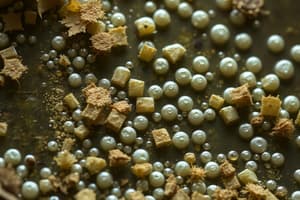Podcast
Questions and Answers
La ecología microbiana investiga la distribución, abundancia e interacciones de los microorganismos en los ecosistemas.
La ecología microbiana investiga la distribución, abundancia e interacciones de los microorganismos en los ecosistemas.
True (A)
Los microorganismos solo incluyen bacterias y virus.
Los microorganismos solo incluyen bacterias y virus.
False (B)
La ecología microbiana estudia la diversidad genómica de los microorganismos.
La ecología microbiana estudia la diversidad genómica de los microorganismos.
True (A)
Los microorganismos no participan en interacciones como competencia, mutualismo o predación.
Los microorganismos no participan en interacciones como competencia, mutualismo o predación.
Los procesos de ensamblaje de comunidades microbianas no se ven afectados por la heterogeneidad espacial.
Los procesos de ensamblaje de comunidades microbianas no se ven afectados por la heterogeneidad espacial.
La ecología microbiana solo se enfoca en la distribución espacial de los microorganismos.
La ecología microbiana solo se enfoca en la distribución espacial de los microorganismos.
Los microorganismos superan en número a nuestro propio universo estrellado por varios órdenes de magnitud.
Los microorganismos superan en número a nuestro propio universo estrellado por varios órdenes de magnitud.
Los microorganismos desempeñan un papel crucial en ciclos de elementos esenciales como la fijación de nitrógeno y la captura de carbono.
Los microorganismos desempeñan un papel crucial en ciclos de elementos esenciales como la fijación de nitrógeno y la captura de carbono.
Los microorganismos no tienen ninguna relación con la salud humana ni con la de los animales.
Los microorganismos no tienen ninguna relación con la salud humana ni con la de los animales.
La diversidad y actividad microbiana no influyen en los esfuerzos de conservación ambiental.
La diversidad y actividad microbiana no influyen en los esfuerzos de conservación ambiental.
Integrar la teoría ecológica con la microbiología no ofrece ninguna promesa significativa para abordar desafíos científicos futuros.
Integrar la teoría ecológica con la microbiología no ofrece ninguna promesa significativa para abordar desafíos científicos futuros.
Un entendimiento holístico del mundo microbiano puede beneficiar solo a la medicina tradicional.
Un entendimiento holístico del mundo microbiano puede beneficiar solo a la medicina tradicional.
Study Notes
Unraveling Microbial Ecology and Microorganisms
Exploring the complex web of interactions between microorganisms and their ecosystems reveals a realm teeming with intricate relationships and profound influences on Earth's biomes. At the heart of this dynamic network stand two core concepts: microbial ecology and the diversely adapted entities called microorganisms.
Microbial Ecology: Foundational Principles
Microbial ecology investigates the distribution, abundance, and interactions of microorganisms across environments. This branch of ecology recognizes that microbes, primarily bacteria and archaea, span an astonishingly broad spectrum of life forms inhabiting nearly every corner of our planet. By studying the ecologies of these tiny inhabitants, we gain valuable insights into the fabric of life itself.
Microbial ecology traverses several dimensions:
- Spatiotemporal Distribution: The location of microbial communities varies immensely alongside shifts in environmental parameters like humidity, light, temperature, and chemical gradients.
- Interactions and Networks: Microorganisms engage in a myriad of interactions, such as competition, mutualism, parasitism, predation, and commensalism, forming dynamic and highly connected networks.
- Community Assembly Processes: Factors driving the formation of microbial communities include the roles played by spatial heterogeneity, niche theory, and coexistence mechanisms.
Such studies directly contribute to addressing significant societal challenges, offering fresh perspectives regarding resource utilization, waste management, and disease control.
Diverse Kingdoms: Microorganisms at Work
At the center of countless ecosystem services, microorganisms exhibit remarkable adaptive capabilities and metabolic flexibility. With estimated numbers reaching (10^{30}) individual cells worldwide, microbes outnumber our own starry universe by orders of magnitude. Their high genetic and physiologic variability facilitates an extensive portfolio of biodegradation, nutrient cycling, and symbiotic associations.
Some notable aspects of microbial diversity and activity include:
- Essential Element Cycles: From carbon sequestration to nitrogen fixation, microbes serve as the linchpins maintaining the balance of essential resources in our ecosystems.
- Health, Reproduction, and Development: Human and animal health relies heavily upon the beneficial actions of microbes. In turn, the complexity of the human microbiome demonstrates intimate symbiotic ties connecting microorganisms with multicellular fauna.
Toward a Synthesized Framework
To capitalize fully on current technological advancements while directing future scientific endeavors, integrating ecological theory and microbiology offers immense promise. Translating knowledge gleaned from microbial systems into broader ecosystem contexts enhances our capacity to manage critical environmental issues, such as resource scarcity, climate change, and disease outbreaks.
As we venture deeper into the fundamentals of microbial ecology, the opportunities presented before us become clearer and more exciting: a holistic understanding of the microbial world heralds the advent of sustainable practices in agriculture, conservation efforts, and cutting-edge medicine.
Studying That Suits You
Use AI to generate personalized quizzes and flashcards to suit your learning preferences.
Description
Explore the intricate relationships and influences of microorganisms within ecosystems, uncovering the foundational principles of microbial ecology and the diverse kingdoms of microorganisms at work. Delve into spatiotemporal distribution, interactions and networks, community assembly processes, essential element cycles, and the symbiotic ties between microorganisms and multicellular fauna.




